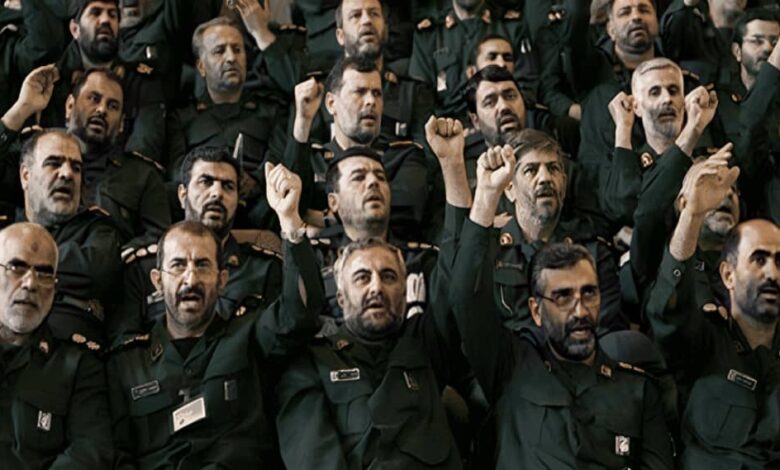Deciphering Contradictory Statements from Iran’s State Officials Regarding Razi Mousavi’s Killing

iran irgc commanders chanting
Written by
Farid Mahoutchi
World Should Stop Taking Contradicting Statements from Iran’s Officials at Face Value
Two minutes read
In recent days, conflicting statements have emerged from various authorities within the Islamic Revolutionary Guard Corps (IRGC) regarding Tehran’s response to the killing of Razi Mousavi. Initially, as the state media reported the death of the IRGC Logistics commander, Persian-language social networks reflected widespread joy among Iranians both at home and abroad.
Consequently, what began as an exposure of the regime’s military-security vulnerabilities rapidly evolved into a significant socio-political phenomenon, potentially carrying more profound implications for a regime that asserts regional dominance yet struggles to safeguard its top command echelon.
In a last-ditch effort to assert power, General Ramezan Sharif, the official spokesperson for the IRGC, promptly took the stage, threatening revenge and declaring the October 7 attacks against Israel as “a response to the killing of Qassem Soleimani, the commander of the Quds Force, by the United States and Israel.”
The comments quickly ignited a global media controversy, paving the way for potential grave developments. While these implications would have a direct impact on the Iranian regime, individuals in the West who had strategically refrained from acknowledging Tehran’s involvement in the deadly conflict in Gaza due to political considerations would find themselves in a challenging and perplexing situation.
Nine hours later, state-run Khabar Online reported, "Commander Ramezan Sharif considered the Al-Aqsa Storm to be entirely #Palestinian and described its results as part of the retaliation for the martyrdom of Quds Force Commander Qasem Soleimani." 2/
Read more:… pic.twitter.com/DDEew611wd— NCRI-FAC (@iran_policy) December 27, 2023
However, before media headlines could solidify into political stances, Tehran shifted its tone. Ramezan Sharif and his superiors retracted from their initial position within less than 12 hours. Many senior officials, particularly the IRGC Commander-in-Chief Hossein Salami attempted to mitigate the rhetoric, asserting that “seeking revenge for Soleimani would entail the complete destruction of Israel.” The claim was deliberately overstated, aiming to prevent political consequences, while practically providing relief for those inclined to appease.
But as the recent incident completes its 48-hour media lifeline, it unveils deeper layers of significance. Even though this regime has never been shy in calling for the destruction of other nations, certain political perceptions tend to view such statements as mere rhetoric for domestic purposes.
Certainly, the clerical regime is struggling with multiple challenges internally. Contending with a restless society while grappling with a demoralized follower base as well as a disgruntled elite that has been increasingly marginalized in recent years. But this internal struggle provides even more motivation for Supreme Leader Ali Khamenei to engage in risky behavior, jeopardizing peace and stability beyond Iran’s borders.
However, the terrorist regime in Iran is also a master of the duplicity game. By employing soft-speaking diplomats, expensive lobbying arms, and self-proclaimed “Iran experts”, it has made sure to interpret its moves and rhetoric for the advocates of the policy of appeasement to avoid global scrutiny and critical decision-making.
THREAD
Despite these statements, the West has insisted on believing that the Possible Military Dimensions (PMD) of #Tehran's #nuclear program have ceased to exist since 2003. 1/8https://t.co/rIVZb6Fq38— NCRI-FAC (@iran_policy) June 4, 2022
Yet beyond all argument and debate, the bloody war in Gaza, funding dozens of militia groups in the Middle East, Africa, and Latin America, and the orchestration of hundreds of terrorist attacks worldwide are tangible and indisputable. These actions represent genuine malicious practices with far-reaching consequences on the global economy and socio-political landscape.
It is an undeniable reality that Khamenei’s regime is the leading state sponsor of terrorism, a nuclear threshold state, and a serious threat to global peace and regional stability. Equally undeniable is the fact that more than any other nation, Iran has experienced the longest and most persistent series of uprisings, marked by the existence of the oldest and most organized Resistance movement committed to eliminating this terror regime.
Rather than merely listening to and attempting to decipher the words of Iranian state officials, world leaders should scrutinize their actions and recognize the harsh truths that lie behind their rhetoric.

